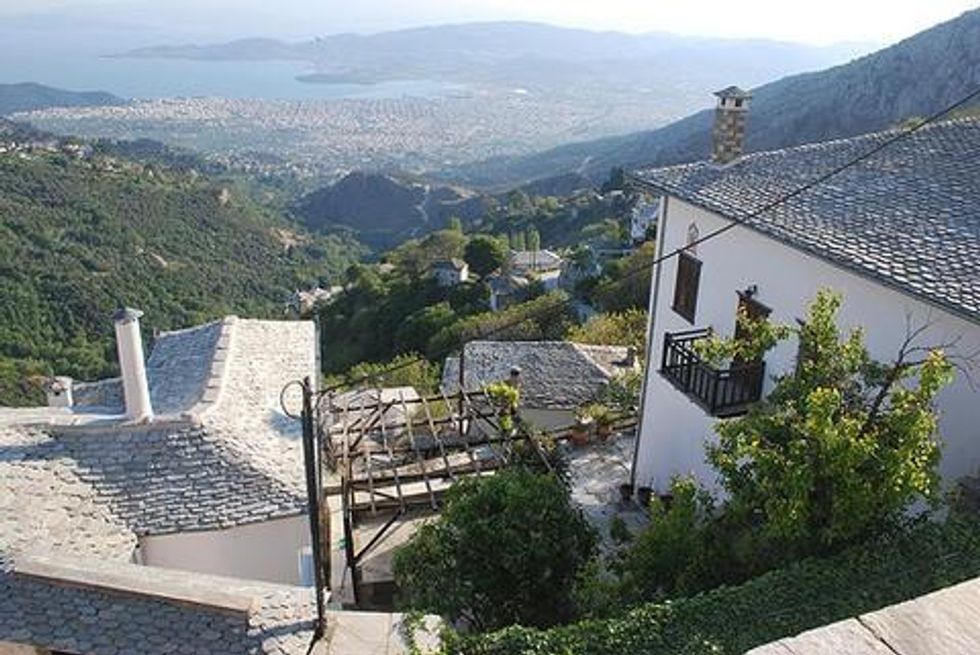As Greece continues to search for solutions to its national economic crisis, the port town of Volos has adopted an old-school barter system to help its citizens muddle through. Five years into their recession with 21 percent unemployment, some Volos residents who were short on Euros but long on other resources created a local currency (called TEMs in Greek) that is traded based on non-monetary contributions into the online system. People sign up for a TEMs network account, see what services they might offer to other folks in their area who are in need, and start amassing credits that can be cashed in for things they themselves need. TEMs can be used for everything from bakers to babysitters, teachers to technicians. In theory, the value of one TEM is equal to the value of one Euro.
One participant, acupuncturist Bernhardt Koppold, explained, "It's an easier, more direct way of exchanging goods and services. "It's also a way of showing practical solidarity -- of building relationships." Maria Choupis, co-founder of the TEMs network, echoed that sentiment regarding the local alternative currency systems: "They are as much social structures as economic ones. They foster intimacy and mutual support."
Speaking to NPR, Volos Mayor Panos Skotiniotis encouraged municipal governments around the world to consider similar programs of their own to fill in where government and the traditional market are failing to adequately serve citizens: "This is a substitution for the welfare state, and that is why this municipality is encouraging it and wants it to grow." For its part, though, the Greek Parliament is also very supportive, passing legislation to encourage various non-traditional forms of "entrepreneurship and local development."
Thankfully, other governments are listening. Many more Germans have jumped into alternative currency systems since the Euro was launched. More than two dozen systems now exist there. Christian Gelleri, managing director of one regional currency, enthused, "We want people to think about this more ... participants of the alternative currencies want to change the money system. We want to promote local charities and connect local businesses -- that's our objective."
The United States, too, has a number of toes in the alternative currency water including Cheers in Detroit, BerkShares in Western Massachusetts, the Bay Area Community Exchange timebank in Northern California, Ithaca Hours in Upstate New York, and more. San Francisco has set up a working group to explore how the sharing economy can benefit citizens and the Creative Currency is being held there later this month. More widely focused is Bitcoin digital currency. Some states, like Utah, have designated gold and silver coins as official legal tender.
Back in Greece, the TEMs system is but one of more than a dozen like it around the country. And, as the new thinking and new currencies take root, more opportunities grow. In Volos, daily markets allow people to barter and trade to their heart's content. Choupis noted, "They're quite joyous occasions. It's very liberating, not using money."
By not being limited by price tags, almost anything is possible. Choupis relayed the story of a woman who arrived at a market with three trays of cakes she had made. The woman's asking price was only one unit per cake, which Choupis questioned: "I asked her: 'Do you think that's enough? After all, you had the cost of the ingredients, the electricity to cook ...'
"She replied: 'Wait until the market is over', and at the end she had three different kinds of fruit, two one-litre bottles of olive oil, soaps, beans, a dozen eggs and a whole lot of yoghurt. 'If I had bought all this at the supermarket,' she said, 'it would have cost me a great deal more than what it cost to make these cakes.'"
No matter the city, keeping resources and economic systems close to home has both a trickle-down and a ripple-out effect. As more and more local governments open their minds and laws to what alternative currencies and sharing economies have to offer, the more resilient, self-sufficient, and sustainable their populations will become.
Sound attractive? Then set up a timebank in your community. Learn about open source timebank software is here.




